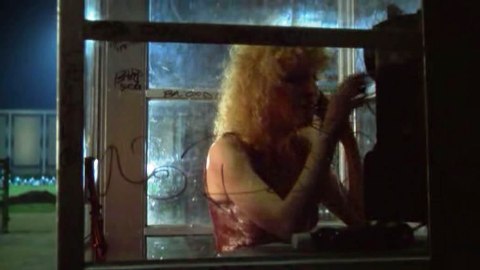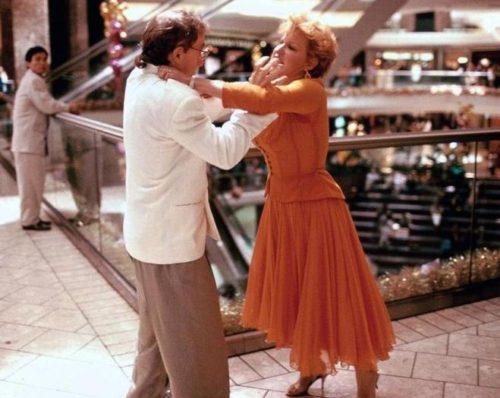Mister D: Methinks not.
Rock stars on 35mm
Rock stars, being natural performers, tend to be decent actors, as long as they are playing musicians. We survey the best of rock and roll celluloid.
by Tara Thorne

In amongst his 244 soundtrack appearances, Paul McCartney has 23 official credits as an actor, mostly voiceovers and Wings DVD compilations. Of course, he did appear as himself in the Beatles movies of the ’60s, including A Hard Day’s Night, Help and Magical Mystery Tour. And in 1978, McCartney appeared in an uncredited cameo in the Beatles-inspired Sgt. Pepper’s Lonely Hearts Club Band, which also featured a VW-busload of the era’s stars in cameo or playing thinly veiled versions of themselves, including The Bee Gees, Peter Frampton and Aerosmith as “Future Villain Band.”
Rock stars, being natural performers, tend to be decent actors, as long as they are playing musicians. Cameron Crowe—of course—cast Seattle locals, including most of Pearl Jam and Alice in Chains, to add authenticity to Singles and recruited Red House Painters’ Mark Kozelek as Stillwater’s bassist in Almost Famous. John Carney, a bassist as well as a director, cast The Frames’ Glen Hansard as the troubadour lead in Once, against his real-life Swell Season bandmate Marketa Irglova as a pianist. Justin Rice of New York indie-pop outfit Bishop Allen has played musicians in the mumblecore efforts Mutual Appreciation and the upcoming Harmony and Me. Eminem’s B-Rabbit in 8 Mile stands as the thinnest contemporary veil on celluloid.
Though a rock star can bring it finely enough, it’s usually more fun to watch the pros do it. This is Spinal Tap is the go-to fake movie band; Michael McKean, Christopher Guest and Harry Shearer are touring together now and have to advertise that they will not be in character. They’re followed closely by the late John Belushi and the late-career-wise Dan Aykroyd in The Blues Brothers. The Commitments has got a dozen years on Once in the Irish musical department. In 1981’s Ladies and Gentlemen, The Fabulous Stains, teenaged Diane Lane, Laura Dern and Marin Kanter are The Stains, a punk band with three practices under its belt that very implausibly—yet, somehow, still awesomely and mostly without pants—gets taken out on tour with Brit medium-stars The Looters and becomes a national sensation. Bette Midler became a star and earned an Academy Award nomination with The Rose, still the best filmed unofficial version of Janis Joplin’s story (until Penelope Spheeris manages to make hers).
In Crowe’s Almost Famous, an autobiographical love letter to the years he spent writing for Rolling Stone as a teen, Billy Crudup and Jason Lee battle for supremacy over the serviceable yet unremarkable ’70s rock band Stillwater. (Crowe, too, is responsible for Lili Taylor’s proto-Riot Grrl Corey Flood in Say Anything, and Campbell Scott’s grunge cool in Singles.) Ethan Hawke’s greasy emo hair fronts grunge band Hey That’s My Bike in Reality Bites, spitting out a cover of Violent Femmes “Add it Up” in a pivotal scene. Terrence Howard and Taraji P. Henson begin Hustle & Flow as pimp and prostitute but end as collaborators on D-Jay’s hit single “Hard Out Here for a Pimp.” (The film also features Ludacris as rapper Skinny Black.) Alessandro Nivola portrays the arrogant lead singer of a band being produced by Frances McDormand in Laurel Canyon (which also features a non-musical appearance by Lou Barlow).
The best music-in-movies treatments come from a pair of Robert Altman films 31 years apart. Nashville (1975) is a typically sprawling, politically charged movie that uses country music as both a backdrop and a distraction, as Joan Tewkesbury’s script pits starlet against has-been, leech against meal ticket and old saw against whippersnapper with literally dozens of stories unfurling during a presidential primary.
A Prairie Home Companion (2006), Altman’s last film, takes place almost entirely in a creaking theatre as a folksy, middle-American radio show readies its last broadcast. (Anytime Meryl Streep sings is a bonus feature all its own, by the way.) The stakes, on paper, are lower than Nashville’s—there will be no assassination attempts in St. Paul—but both films are packed full of dreamers, of entertainers, some who’ve lost and some who don’t realize they’re losing, along with the tiniest handful of winners too. And if movies and music, as art, are supposed to reflect our lives back to us, they’re stronger together than apart: Every Joe does lie when he cries.

![Reblog this post [with Zemanta]](http://img.zemanta.com/reblog_e.png?x-id=d7c86e47-4253-4aa6-a7a3-1dbb709593a6)





